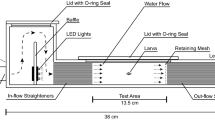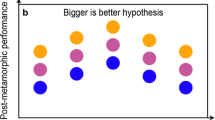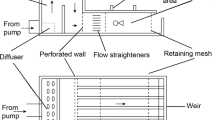Abstract
To date, all sustained swimming experiments on tropical reef fish larvae have been conducted using unfed larvae. Such studies may produce unrealistic estimates of sustained swimming abilities. We examined the effect of food on the sustained swimming ability of late-stage Amphiprion melanopus. Larvae were swum in a six-channel swimming flume at 7 cm s–1, with "unfed" and "fed" channels. Fed channels had Artemia nauplii added four times per day for 10 min. Feeding larvae during swimming experiments significantly increased their average swimming distance from around 6.9 to 12.2 km, and the maximum swimming distance from around 11.8 to 28.7 km. Existing flume-based estimates of sustained swimming may be underestimating field abilities. With access to food, many larvae may have the potential to swim considerably greater distances than previously suggested.
Similar content being viewed by others
Author information
Authors and Affiliations
Additional information
Electronic Publication
Rights and permissions
About this article
Cite this article
Fisher, R., Bellwood, D. Effects of feeding on the sustained swimming abilities of late-stage larval Amphiprion melanopus . Coral Reefs 20, 151–154 (2001). https://doi.org/10.1007/s003380100149
Received:
Accepted:
Published:
Issue Date:
DOI: https://doi.org/10.1007/s003380100149




